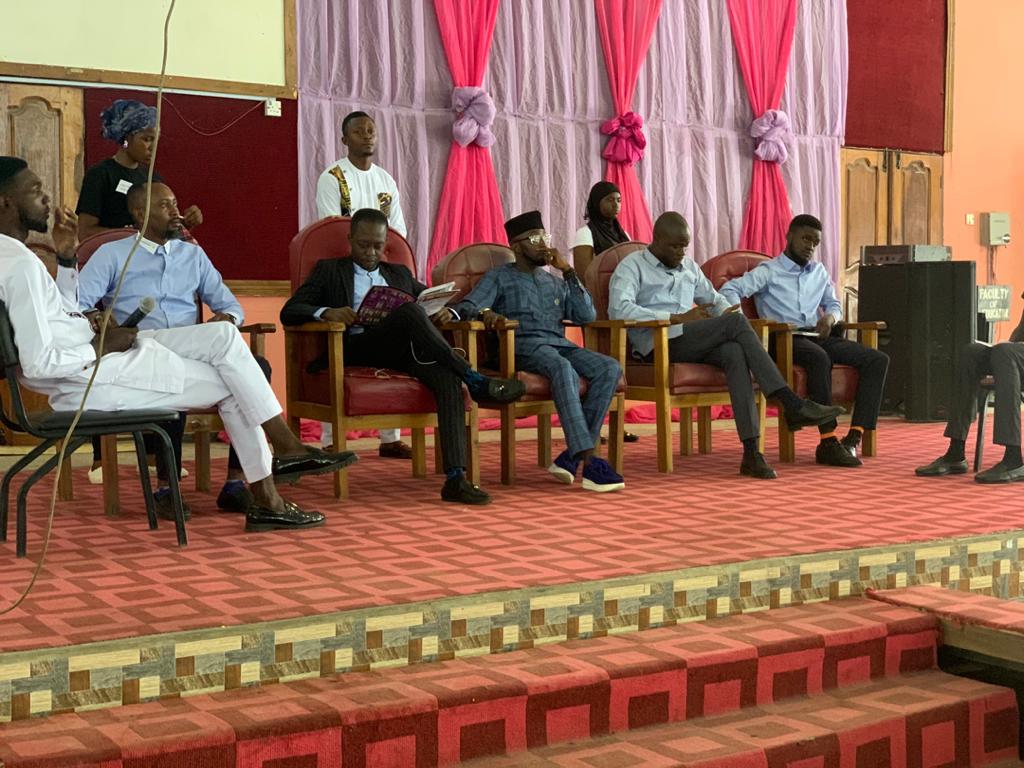Mass communication students have been urged to double their efforts in acquiring relevant experience, networking, relationship, and career-building during their studies to prepare them for the media industry.
The call was made by top media professionals at the 14th annual public lecture and symposium of the press week by the National Association of Mass Communication Students (NAMACOS), Adekule Ajasin, University, Akungba, Akoko AAUA.
The theme of the lecture was ‘beyond grade: meeting demands of the media industry
Mr. Segun Olakoyenikan, a fact-checking journalist with AFP stated that studying in higher institutions is not just about the grades as the path to a future career begins in school with lots of opportunities to get practical experiences.
He noted that many students only study to pass and get good grades, but fail to gather experiences which is the master of all study.
“Most students study simply to get good grades. I think, somehow, the education system overemphasizes how to make good grades. However, students should understand and appreciate the areas in which they are interested and capable of excelling”.
He equated meeting the demand of the media industry to demand and supply in the economics, where consumer demand for goods and such demand is met by the supplier supplying the goods to meet the needs of the consumer.
While stating that getting good grades is necessary due to requirements for employment, the executive director of Media Career Development Network, Mr Lekan Otufodunrin urged the students to have relevant skills to make them industry-ready.
“You must have the practical knowledge and be able to prove it. There is no room for learners. You need to have evidence that you have done a bit of campus journalism or taken advantage of the various platforms to publish or broadcast. The experience media organizations will demand from you starts from now,” he said.
According to the veteran journalist, the preparation for the industry involves having loads of links to publications or broadcasts, becoming creative and coming up with new concepts of what new ways new media can be applied for publishing, broadcasting and other endeavours.
According to him, students need to read widely and be knowledgeable not only about current issues but new developments.
“You must develop a global mindset and be ready to take up challenges you may be presented within your efforts to breakthrough in the industry. Learn to take online courses and attend professional conferences”
He encouraged the students not to be scared about what lies ahead despite the various negative reports they may have been heard because every profession has its baggage.
“Come ready with a knowledge-based determination to make a difference and succeed where others might have failed. Be inspired by the stories of young journalists that have accomplished what many before them did not achieve,” he assured.
In his contribution, Mr Lulu Fawehinmi, a communication consultant and state coordinator, PMG, affirmed that students should familiarize themselves with information communication technology (ICT) which is broad, and growing faster.
He also urged the students to be conscious and embrace the habit of seeing life beyond grades and certificates, which cannot earn them a job after graduation.
According to him, “Whatever students curriculum, there are probably some subjects students are not graded on at all, or that they have decided are not their strengths. In some cases, this can be a fairly sensible approach: if the student is determined to become a doctor, it is unwise for them to put all of his or her energies into a pass and fail a Religious Studies class at the expense of Chemistry grade”.
In his admonition, Mr. Shola Ilesanmi, a freelance journalist with BBC and AFP noted that mass communication students have the opportunity to do better on the field than those who study other courses but find themselves in the media industry because they are supposed to know more about journalism than those who are trying to hijack the profession.
He affirmed that to compete with others in the profession, skills are required because of the competitive nature of the industry and what is in vogue, and what obtains outside the campus.
“At the same time, trying hard when you do not need to, or when it is especially hard, is a valuable life skill. If you allow yourself to be motivated only by the possibility of getting a top grade, you will struggle in the parts of life where there is no such thing as the equivalent of a top grade.
“ Learning to motivate yourself when there is not an immediate payoff is something that will pay dividends later on in life, whether that is in compulsory courses at university or in learning to drive,” He stated.
Mr. Olumide Olamide of Empire Radio noted that other challenges affecting mass communication students in meeting up with the standard and being able to compete with others who study other courses were lack of proper facilities and inadequate equipment and personnel for the department to teach the practical aspect of the course effectively as expected and stipulated in the curriculum of National University Commission (NUC).
He urged campus journalists to embrace the habit of starting small and think big, urging them to shun the habit of starting with the ambition of getting paid and upgrade their skills personally.
Mr. Saheed Ibrahim of The Hope Newspaper emphasized that students must possess five things before graduating from school as he listed ‘Opportunities, training, information, networking, professional bodies, and structure.’
“Even if you are not sure exactly what you would like to do as a career, most work experience will show future employers that you can be punctual, responsible and able to work with others”
Mr. Abiodun Adewale of Ondo State Radiovision Corporation (OSRC ) added that students should maintain objectivity in any industry they find themselves in the nearest future.

